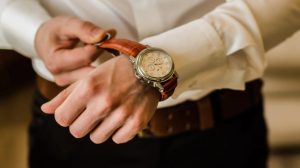Table of Contents
ToggleYou’ve got a brilliant idea. The kind that keeps you up at night, sketching plans on napkins and researching domain names. But when it comes to funding, reality kicks in fast; your bank account isn’t exactly cheering you on. If pitching to investors or applying for a loan feels miles away, don’t panic.
There’s one overlooked solution sitting right under your nose… or tucked away in your jewellery box, parked in your garage, or wrapped around your wrist.
From luxury watches to forgotten gadgets, your personal belongings could hold the key to launching your startup, without giving up a slice of your company or burying yourself in debt.
So what’s actually worth something, and how do you turn it into capital that works for you? We’re just getting started, what you own might just be your smartest investor yet.
6 Smart Ways to Fund Your Startup Using Personal Assets
1. Sell Your Luxury Watches

A watch isn’t just for telling time. It could be the starting point for your business. If you’ve got a luxury timepiece tucked away, it might be doing more good on your wrist than in your drawer.
Or better yet, funding your dream. Brands like Rolex, Patek Philippe, and Omega often hold strong collateral value, especially if they’ve been kept in good condition.
Unlike more complex funding strategies, selling high-end items like watches is refreshingly straightforward. You won’t be dealing with banks or pitching to investors. Instead, you’re tapping into the watch resale market, where demand for authentic luxury goods remains strong.
Plenty of new founders look for creative ways to self-fund their ventures using what they already own, and if you have a high-value watch collecting dust in your drawer, one of the most popular routes is to sell watches for cash through trusted platforms and dealers that understand the true worth of your timepiece.
It’s a simple process that allows you to release capital tied up in an item you no longer use. To get started, use an online valuation tool to request a watch appraisal. Having the original box and papers helps boost the resale price.
2. Liquidate Electronics and Gadgets
Before you toss that old laptop into a drawer or let your unused phone sit idle, think about this, your forgotten tech might just be the bridge between your idea and your first sale.
Electronics tend to lose value fast, but certain items, especially those in good condition or with popular specs, still have decent resale value if sold at the right time.
It’s surprising how many entrepreneurs overlook this simple source of startup capital. You might not raise thousands from a single device, but a few high-demand gadgets could cover your website setup, initial marketing, or product prototyping.
Whether it’s an extra iPad, a DSLR camera you barely touch, or a lightly used gaming console, these devices can be turned into tangible support for your business.
Second-hand marketplaces like Facebook Marketplace or eBay are excellent places to list your items, but if you want a faster turnaround, local tech buyback stores or online dealers may offer immediate payment.
Just make sure to clear all personal data before handing anything over. Turning electronics into cash won’t fund your entire business, but it’s a smart first step toward building your initial capital without dipping into savings.
3. Use Your Collectibles for Funding

Tucked away in a cupboard, that forgotten box of “junk” might be more valuable than you think. Whether it’s a foil-stamped trading card, a vintage coin set, or an old comic sealed in plastic, collectibles have a curious way of turning sentimental clutter into serious cash.
Unlike everyday items that lose value quickly, the right collectible can become more desirable over time. Some rare finds are worth hundreds, even thousands, especially to passionate collectors or investors on the hunt for hidden gems. It’s not uncommon for a business owner to cover early startup costs by parting with a prized item they hadn’t looked at in years.
Start by listing what you own and researching its worth using trusted tools like WorthPoint or specialist grading guides. If something looks promising, a professional appraisal can give you confidence before selling.
Auction houses and collectors’ marketplaces can connect you with buyers willing to pay what it’s truly worth. What was once a childhood obsession could now be your ticket to launching something entirely new.
4. Sell Your Unused Vehicles
Every month, it sits unused, that second car or ageing motorbike quietly drains money from your pocket. Insurance, maintenance, and tax all add up. But what if that vehicle could do more than take up space? What if it could bankroll the early days of your startup?
Vehicles are among the few personal assets that can generate a large sum relatively quickly. If you’ve got a van gathering dust or a car that no longer suits your routine, selling it could bring in the kind of capital that helps you build your first product or hire your first freelancer. Some founders have even funded their entire launch costs this way.
Check its current market value using trusted automotive sites or dealer evaluations. If you’re aiming for a higher return, consider selling to a private buyer rather than trading it in. Well-documented service history and a clean condition can make all the difference.
With the paperwork sorted and ownership transferred, your unused vehicle becomes something far more valuable, a financial launchpad.
5. Liquidate Jewelry and Other Valuables

Tangled chains at the bottom of a drawer or a ring you haven’t worn in years might be more useful than you think. That jewellery, once given as a gift or bought for a special occasion, could now serve a different purpose, funding your business idea.
Gold, diamonds, and other precious items tend to hold strong resale value, especially when market demand is high. What once marked a milestone might now help you reach a new one.
Many new business owners have kickstarted their ventures by parting with heirloom pieces or luxury jewellery they no longer felt attached to. The emotional pull might be there, but the financial opportunity could be worth it.
Before selling, always have your pieces appraised by a qualified professional. An expert opinion gives you clarity on what your items are really worth and puts you in a stronger position when negotiating a price.
When you’re ready, choose a trusted platform or specialist dealer with a solid track record. A few neglected items from your jewellery box could become part of a smart financial strategy, turning personal wealth into meaningful business capital.
6. Utilize Your Personal Savings and Liquid Assets
There’s something empowering about backing your own idea with your own money. No paperwork, no lenders, no awkward pitches. Just you, your savings, and a belief that it’s all worth it.
While it might not sound as thrilling as selling a vintage watch or rare comic, your personal savings are often the most direct and flexible source of startup capital.
Unlike physical assets, liquid funds give you immediate access to business capital without the hassle of appraisals or negotiations. Whether it’s money set aside for travel, a home renovation, or simply parked in a high-interest account, rethinking its purpose could make all the difference in your early-stage startup journey.
That said, caution matters. Review your total savings and set clear boundaries on how much you’re comfortable investing. A financial advisor can help you strike a balance between risk and opportunity.
From there, build a budget that ensures every pound is allocated with intention. Using your own funds doesn’t just give you control, it gives you clarity, something every founder needs when they’re just getting started.
Conclusion
Starting a business doesn’t always require chasing investors or maxing out credit cards. Sometimes, the funding you need is already sitting quietly in your closet, your driveway, or your savings account.
By turning personal assets into business capital, you’re not just raising money, you’re making a smart, self-reliant move that keeps your equity intact and your vision fully yours.
Think of it this way: instead of asking someone else to believe in your idea, you’re proving you already do. That kind of confidence? It’s more valuable than gold and maybe even that watch you just sold.




